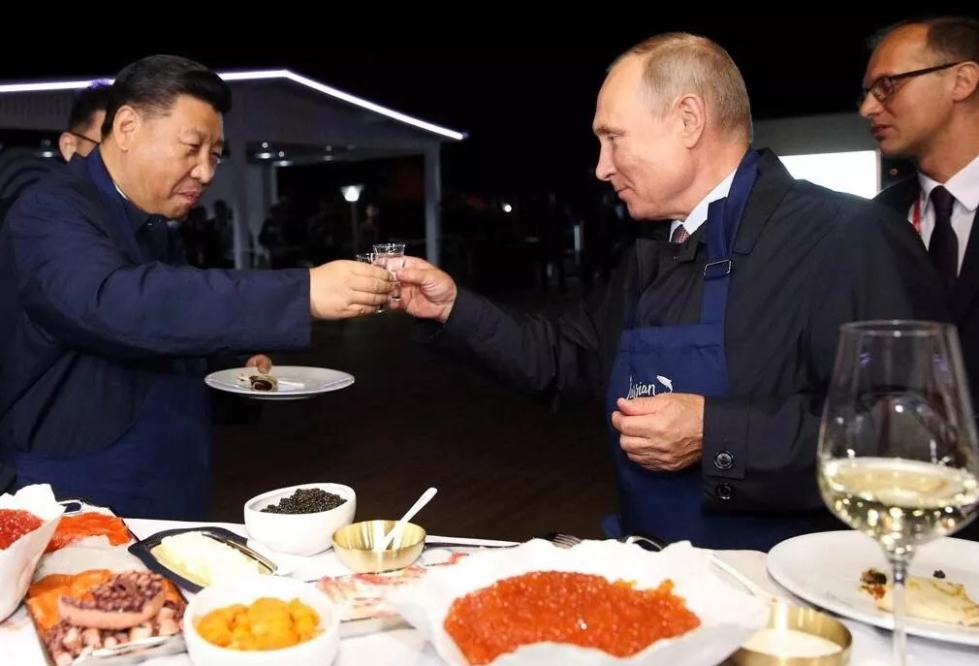Xi eats caviar, downs vodka with Putin, and smiles at Abe

One view among China-watchers is that Beijing was unprepared for the change in mood in Washington, D.C. Xi Jinping and his advisers had not realized the depth of anti-China sentiment across party lines, nor the hostility to Beijing common to Donald Trump, Bernie Sanders, Marco Rubio, and American politicians of almost every ideological hue.
But if all of Xi’s men really were unaware of how Washington’s feelings have changed, they certainly know by now. A recent commentary (original Chinese, or see the SCMP summary) by a senior official in the People’s Daily made it clear: “The trade war is not just a measure for the US to gain more economic benefits, it is also an important strategy to contain China.”
I believe we are starting to see how China will adapt to this new reality. Doubling down on the Belt and Road is one predictable and rational response: China will want to ensure that its communications and logistics are not controlled by the U.S. Another reaction will only speed up trends that predate the Trump era: a thaw in ties with Japan, and a bear hug for Russia.
Xi Jinping just concluded a trip to Vladivostok, where he attended the fourth Eastern Economic Forum (EEF), met with leaders of other countries in the region, and held talks with Putin.
HUGGING RUSSIA
- Xi and Putin made blinis: In front of TV crews and journalists, they cooked the pancakes themselves, added caviar and sour cream, and then downed them with a shot of vodka. RT has a video.
- Xi enjoys set pieces such as this — he had a beer and fish and chips with former prime minister David Cameron when he visited the U.K. in 2015 — but Xi donning an apron and literally making and breaking bread with Putin sends a very clear message.
- If the pancakes and vodka don’t make it clear, Xinhua News Agency is happy to oblige with whole paragraphs of Partyspeak:
[Xi’s] visit has infused new dynamism into China-Russia ties, opened new prospects for regional cooperation, and brought new vitality to international relations… The strategic guidance by and close contact between the heads of state of China and Russia serve as powerful engines for the development of bilateral relations… Xi and Putin had their third meeting in four months, charting the future course of the China-Russia comprehensive strategic partnership of coordination and exchanging views on major international and regional issues… That has highlighted the height and uniqueness of the China-Russia relationship… The two sides agreed to tighten strategic coordination, firmly support each other, and safeguard their own interests as well as the common interests of the international community… Xi and Putin charted the course for bilateral pragmatic cooperation in the next phase…
- See also Global Times on Twitter: “China-Russia cooperation in finance has been going smoothly in recent years, but not fast enough. Under the currency swap deal, yuan-ruble payment mechanism should be more widely used in bilateral trade activities, said former central bank governor Zhou Xiaochuan during #EEF2018.”
MENDING TIES WITH JAPAN
Japanese prime minister Shinzo Abe was also at EEF, where he met Xi earlier today.
- Xi told Abe that the two countries should “firmly defend multilateralism, the free trade system and the rules of the World Trade Organisation to push forward an open global economy,” reports the South China Morning Post (or see the Xinhua report for Chinese source of statements).
- “Japan and China find common ground in Trump’s tariffs as leaders meet” is how the Wall Street Journal saw the meeting (paywall), which says that although Abe didn’t directly mention the U.S. or the tariffs, he agreed with Xi “that China and Japan, as the world’s second- and third-largest economies, had a responsibility to promote global prosperity.”
- “Relations between China and Japan are getting back on track” (中日关系正步入正常轨道 zhōngrì guānxì zhèngbù rù zhèngcháng guǐdào) said Xi, but he also warned Japan to properly handle “sensitive issues over history and Taiwan.”
- Abe also confirmed his plans to visit China this year. This would be the first trip to Beijing by a Japanese prime minister since 2011. “I intend to visit China this year, the year in which we commemorate the 40th anniversary of the conclusion of the Treaty of Peace and Friendship between Japan and China,” said Abe, according to Agence France-Presse.
- You can literally see warming Japan-China relations reflected in Xi Jinping’s face over the past four years as pointed out by Bloomberg reporter Peter Martin: A history of Sino-Japanese relations through Xi Jinping’s facial expressions.






